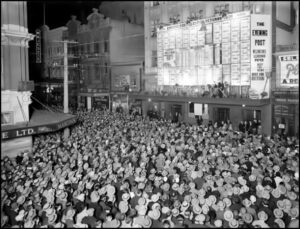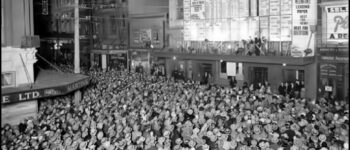1946: Ending For The Election Night Assembly
September 10, 2021
By AHNZ
 This image from 1931 shows The Evening Post, Willis Street, Wellington, at the center of attention after the votes were cast in that year’s election.
This image from 1931 shows The Evening Post, Willis Street, Wellington, at the center of attention after the votes were cast in that year’s election.
Similar photos exist for other elections, some outside The Dominion newspaper’s office. Did the two papers compete to host this attraction or did one wrest it away from the other? Today rival TV stations compete for our attention as they call cover the in-coming results.
Other cities did the same but not for very much longer. In 1946 Jack Marshall, future Prime Minister, was elected for the first time and spoke to the assembled crowd using what he calls a “newfangled contraption,” a public-address system. According to Marshall’s memoirs radio had decisively replaced generations of such gatherings by the following election in 1949.
“This multitudinous assemblage of the populace had been a feature of election night for generations. The crowd was cheerful and noisy, but orderly. According to their political leaning, they cheered or booed each result as it was posted up.”
“It was good clean fun in the best democratic tradition, but this particular institution was on the way out. Radio was on the way in and, by the time of the next election, in 1949, had taken over. People preferred to listen to election results in the comfort and privacy of their own homes or with a group of friends.” – p101 Jack Marshall (1983)
The change of medium from all factions in-person to cliques in their own chambers must signal a change in the public’s relationship to politics. I think it facilitated our becoming more estranged from different views to our own, making the next generation of Kiwis more fractured into in-groups and out-groups.
 If he’s right, Marshall has put his finger on a point in time where New Zealanders became more parochial and less diverse. Having to share space with people who radically disagree with you requires manners and courtesy. According to the creator of Conan the Barbarian people who live up close enough to bash one another’s skulls in are the most courteous of all because if they weren’t there would be constant outbreaks of violence. It’s a triumph of our civilising culture that humans can travel together for hours in an enclosed space like an airplane without trying to rob or kill or have sex with one another as any other menagerie of known life forms would!
If he’s right, Marshall has put his finger on a point in time where New Zealanders became more parochial and less diverse. Having to share space with people who radically disagree with you requires manners and courtesy. According to the creator of Conan the Barbarian people who live up close enough to bash one another’s skulls in are the most courteous of all because if they weren’t there would be constant outbreaks of violence. It’s a triumph of our civilising culture that humans can travel together for hours in an enclosed space like an airplane without trying to rob or kill or have sex with one another as any other menagerie of known life forms would!
Group in-person gatherings in a community impose a necessity on internalising the ability to get along and respect your fellow man. Whole lattices of body language and physical presence non-verbal communication are sliced off when we are separated but joined only by wireless radio or social media or videoconferencing (eg Skype, Zoom.) The changes we made to our technology end up changing us, just as Samuel Butler warned New Zealanders in 1863 and Neil Roberts in 1982.
Even the newspaper and its massive city election results board was itself a form of technology that had changed the way communities related to each other and elections were perceived. The image up top in Wellington might have looked this way each election for generations but it was not our year zero. No more was the year a PA system was used, or when radio replaced it, or the rise of television, or computerised communication.
This is why history doesn’t just travel in a circle (which is hard enough to convince people of) but a spiral. This iteration of an historic cycle is not like the last one because they had steam and we have rockets. They had stone tools and we have electricity. We fine people where our ancestors lynched them. Historian Lawrence Stone explored game-changing technology of this sort that changed human behavior, speaking on the shift from broadswords to rapiers which made scuffling with blades into a deadly business demanding of an attitude change. He also points out the once internalised restraint in sexual behavior that became out-sourced to technology when contraceptive technology advanced.
“Civilized men are more discourteous than savages because they know they can be impolite without having their skulls split, as a general thing.”- Robert E Howard, creator of Conan the Barbarbarian
“After about 1560 the broadsword began to give way to the needle-sharp rapier, with which it was only too easy to kill a man by running him through the body. The introduction of this new weapon has had consequences exactly the reverse of that of the contraceptive : The one increases, the other decreases, the risks attendant upon two instinctive and pleasurable acts, fighting and making love. It was with a rapier that Edward Earl of Oxford accidentally killed his man while still in his teens in Lord Burghley’s house in 1567, that John Lord Latimer ran a man through in 1563, that Robert Earl of Sussex seriously wounded one of his own men in 1598 when trying to break up a quarrel. The rapier was as dangerous a weapon as a sports car in the hands of a high-spirited young man with little sense of self-control and no rules of conduct to regulate his behavior. Worse still was the spread of small-arms. With these handy little tools a cowardly and weakling churl was a match for the bravest, strongest, and most skillful of noblemen.” – Stone (1967)
“Politics has become a cruel business since the advent of television, at least for its principal actors…There is no longer any sense of distance between politicians and public: the politician’s personality is on public view, to be taken apart and picked over.”– Bruce Jesson (1986)
 An overall trend in New Zealand history, where we are all going, is for each person to be more atomised and so more estranged from empathy and sympathy for his fellow man. Individuality, connection, community, social capital, is replaced by the bureaucratic technology of The State.
An overall trend in New Zealand history, where we are all going, is for each person to be more atomised and so more estranged from empathy and sympathy for his fellow man. Individuality, connection, community, social capital, is replaced by the bureaucratic technology of The State.
Once we could all entertain a thought without accepting it. Contrary views and the people who held them were normal and acceptable. Increasingly, anyone encountered who is ‘off the reservation’ or outside the very narrow Overton Window is a triggering offence and must be removed. That is, de-platformed or cancelled or censored. And, we have just the technology to do it. The empathy muscles our Colonial ancestors had have since atrophied. “Offensive” stimuli are removed to the point where the now-protected species, the New Zealander, must retreat (flight) to a Safe Space (freeze) or have a government agency destroy (fight) any new and unfamiliar ideas outside the comfortable (Blue Pill) group-think echo chamber!
The Government lockdowns of 2020 and 2021 have been the high point of estranging an already atomised population from one another. Eg. Self-isolation, face masks, mass compliance, hyper-vigilance, snitching on non-conformists, the urging to “sanatise” yourself if you get close enough to touch something another human may have touched.
Statism will address snuffing of the Pioneer Spirit or much less solve it. Powerless people are the lifeblood of Government. If New Zealand is to have a future, Anarchism is essential.
—
Image ref. Crown Studios of Wellington, Alexander Turnbull Library
Ref. John Marshall Memoirs vol1, Marshall (1983)
Ref. The Crisis of the Aristocracy, 1558-1641 by Lawrence Stone (1967)
 Like Comment Share
Like Comment Share





